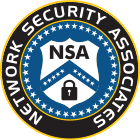
The increase of remote work has revolutionized the modern workplace, providing employees with flexibility and freedom. However, with this newfound convenience comes the responsibility of ensuring your digital security. As remote work becomes more prevalent, cyber threats continue to evolve and pose risks to individuals and organizations. Here are the best practices to stay safe online while you are remote working.
Use a Secure Network
Always connect to a secure and trusted Wi-Fi network when working remotely if able. When on public Wi-Fi networks you may be more susceptible to hackers and cybercriminals. Use a virtual private network (VPN) to encrypt your internet connection and protect your sensitive data from prying eyes when on public Wi-Fi. A reputable VPN service will create a secure tunnel between your device and the internet, enhancing your online privacy and security. Good VPNs are setup and provided by your company or paid for. Free VPNs have to make money somehow so it always begs the question what of yours are they selling to keep the lights on.
Enable Two-Factor Authentication (2FA)
Two-factor authentication is an additional layer of security that requires you to provide two forms of identification before gaining access to an account. Enable 2FA wherever possible, as it significantly reduces the risk of unauthorized access. Utilize authentication apps or hardware tokens, rather than relying solely on text messages or emails for verification codes, as they are more secure. Some services can be tied into a single 2FA provider easing the load on you and your staff.
Keep Software Up to Date
Regularly update your operating system, applications, and antivirus software. Software updates often include security patches that address vulnerabilities exploited by cyber attackers. Configure automatic updates to ensure you’re always protected with the latest security improvements. If you are the business owner this means keeping your staff’s devices up to date as well.
Secure Password Practices
Create strong and unique passwords for all your accounts and avoid using easily guessable information like birthdays or common words. Implement a password manager to securely store and generate complex passwords. Never share your passwords, and change them regularly to reduce the risk of unauthorized access.
Be Cautious with Emails and Links
Phishing attacks remain a prevalent threat to remote workers. With working outside the usual office environment, you may be more susceptible to falling for these scams. Exercise caution when clicking on links or downloading attachments from unknown or suspicious emails. Verify the sender’s identity, by phone if necessary, and double-check the URL before entering sensitive information on websites. The best thing to do is not use links in emails and go to the website yourself.
Encrypt Sensitive Data
All devices should be encrypted. Having them out of the office, especially if they are in cars, can increase the physical exposure these devices have to thief’s. Strong encryption will make it so your data is secure if the worst happens.
Keep your work devices locked with strong passwords or biometric authentication. Set up screen timeouts to automatically lock your device after a period of inactivity.
Separate Work and Personal Devices
If possible avoid using, or having your staff use, personal devices for work purposes, and vice versa. Maintaining a clear distinction between work and personal devices helps reduce the risk of cross-contamination and minimizes exposure to potential security breaches.
Educate Yourself and Your Team
As with all workplaces, remote work requires proper training and support for your employees. Majority of breaches happen because of human error. Managed Service Providers, like NSA, offer comprehensive cybersecurity training and ongoing assistance to help your workforce embrace remote work tools and practices seamlessly. It is important to regularly educate yourself and your team members, and encourage an open and supportive environment for reporting security concerns.
Regular Backups
Frequently back up your work data to secure locations such as cloud storage. In the event of a cyber incident or hardware failure, having backups ensures you can quickly recover critical information without significant disruptions.
Remote Work Success!
Working remotely offers tremendous benefits, but it also comes with the responsibility of safeguarding your digital security. By following these ten essential tips, you can significantly reduce the risk of falling victim to cyber threats and ensure your remote work experience remains safe, productive, and worry-free. If you have anymore questions or need help implementing these practices and more into your business, feel free to contact us as we would be happy to help.

